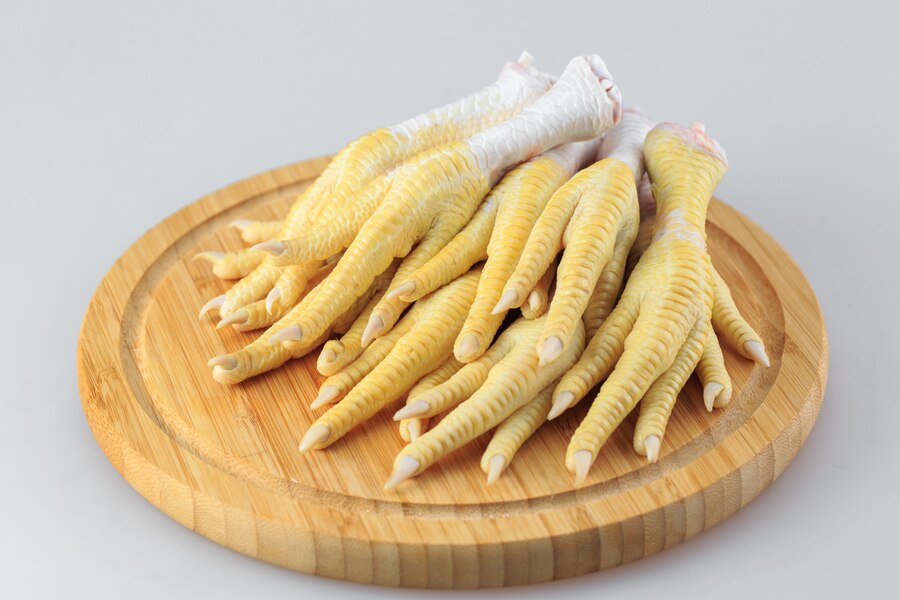Chicken feet are good for dogs as they provide essential nutrients like glucosamine and chondroitin. These help support joint health and mobility.
Chicken feet offer a natural source of glucosamine and chondroitin, which are vital for maintaining healthy joints in dogs. They also contain collagen, which promotes strong bones, skin, and coat. The act of chewing chicken feet can help clean your dog’s teeth and reduce plaque buildup.
Chicken feet are low in calories and make for an excellent, crunchy treat. Always ensure the chicken feet are raw or dehydrated, not cooked, as cooked bones can splinter and pose a choking hazard. Regularly incorporating chicken feet into your dog‘s diet can contribute to overall health and well-being.
Nutritional Benefits
Chicken feet are rich in glucosamine. Glucosamine is essential for joint health. It helps dogs maintain strong joints. Older dogs benefit the most. Puppies can also benefit. Glucosamine aids in reducing joint pain. It helps in repairing cartilage. Dogs with arthritis find relief from glucosamine. Always consult a vet before adding new foods.
Chicken feet have a high collagen content. Collagen is vital for healthy skin and fur. It also supports joint health. Collagen keeps the skin elastic. Shiny fur is a sign of a healthy dog. Collagen helps in faster healing. Dogs with skin problems benefit greatly. Adding chicken feet can improve overall health.
Dental Health
Chicken feet act as natural toothbrushes for dogs. They help scrape away food particles. This keeps the teeth clean and healthy. Chewing on chicken feet promotes good oral hygiene. The texture of chicken feet helps remove buildup. This can prevent dental issues.
Chewing chicken feet can reduce plaque on dogs’ teeth. Plaque buildup can lead to gum disease. Regular chewing helps keep plaque under control. This can reduce the risk of dental problems. Chicken feet are a natural way to maintain dental health. Dogs enjoy the taste and texture of chicken feet. This makes them a fun and healthy treat.
Joint Health
Chicken feet are rich in natural collagen. Collagen helps reduce arthritis symptoms in dogs. It supports joint health and reduces inflammation. Dogs with arthritis can experience less pain. Chicken feet help improve their quality of life.
Chicken feet contain glucosamine and chondroitin. These compounds are essential for joint mobility. They help repair cartilage and improve joint function. Dogs can move more easily and stay active. Regular consumption can make a noticeable difference.
Potential Risks
Chicken feet can break into small, sharp pieces. These pieces might cause choking in dogs. Always supervise your dog while they eat chicken feet. Make sure the pieces are not too small. Large pieces can also block the throat. This can be very dangerous for your dog. Avoid giving chicken feet to small dogs.
Raw chicken feet may contain harmful bacteria. Salmonella and Campylobacter are common bacteria found in chicken. These can make your dog very sick. Always cook chicken feet properly to kill bacteria. Wash your hands after handling raw chicken feet. Clean all surfaces that touch raw chicken. This keeps your dog safe from bacteria.
Preparation Tips
Raw chicken feet are very nutritious. They are full of natural glucosamine. Cooked chicken feet can be dangerous. Bones become brittle when cooked. This can cause choking or injury. Always supervise your dog with raw chicken feet. Ensure they are fresh and clean.
Dehydrating chicken feet is a safe option. Use a food dehydrator for best results. Set the temperature to 160°F. Dry them for 24 hours. You can also use an oven. Set it to the lowest temperature. Leave the door slightly open. This will help moisture escape. Dehydrated chicken feet last longer. Store them in an airtight container. Keep them in a cool, dry place.
Feeding Guidelines
Chicken feet are a tasty treat for dogs. But it is important to control portions. Small dogs should get one foot per day. Larger dogs can have two to three feet. Always watch for any changes in behavior or digestion. Too much can lead to upset stomachs.
Feed chicken feet to dogs a few times a week. This helps keep their diet balanced. Make sure to mix in other foods too. Chicken feet should not be the main food source. They are a treat, not a meal. Keep an eye on your dog’s overall health.
Alternatives To Chicken Feet
Chicken feet offer benefits for dogs, but there are several alternatives like beef tendons, pig ears, and duck feet. These options provide similar nutritional value and chewing satisfaction.
Other Animal Parts
Beef trachea is a good option. It is rich in glucosamine. This helps joint health. Pig ears are another choice. They are tasty and chewy. Lamb tails can be offered too. They are high in protein.
Commercial Dog Chews
Dental chews help keep teeth clean. They come in many flavors. Rawhide bones are long-lasting. They satisfy chewing needs. Bully sticks are natural and digestible. They are also high in protein.
Another Post: Is Natural Balance a Good Dog Food
FAQ
Are Chicken Feet Safe For Dogs?
Yes, chicken feet are safe for dogs. They provide natural glucosamine, which supports joint health.
Can Dogs Digest Chicken Feet Easily?
Yes, most dogs can digest chicken feet easily. They are chewy and help clean teeth.
How Often Can Dogs Eat Chicken Feet?
Dogs can eat chicken feet 2-3 times a week. Always supervise and ensure they are appropriate for your dog’s size.
Conclusion
Chicken feet can be a nutritious treat for dogs when prepared properly. They offer joint and dental benefits. Always consult your vet before adding new foods to your dog’s diet. Monitor for any allergies or reactions. With proper care, chicken feet can be a healthy addition to your dog’s nutrition.

